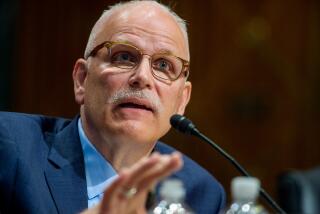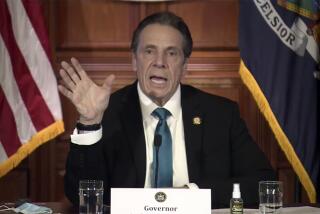Bush Advisers Say Sununu Can Survive Furor
- Share via
WASHINGTON — Bush Administration officials and advisers said Sunday that White House Chief of Staff John H. Sununu may be able to hang onto his job if he keeps his head down, limits his out-of-town travel and avoids controversy, despite a report that the President is under increasing pressure to fire him.
Bush himself gave a thumbs up sign and a nod when asked Sunday if he intended to retain Sununu, whose travel practices have sparked a growing furor. Bush made the gesture in response to a reporter’s question as he returned to Washington from a weekend at the Camp David presidential retreat in Maryland. The President did not elaborate as he and his wife walked into the White House after landing in a helicopter.
Last week, the President delivered a rare public rebuke to Sununu by saying his top aide’s travel arrangements had created “an appearance problem.” And Sununu, in a statement Saturday, conceded his actions had created the “appearance of impropriety.”
But Bush was said by those close to him to be extremely reluctant to dismiss a senior aide who is under fire. Even as Bush criticized him last Wednesday, he said Sununu was doing a “first-class job.”
On Sunday, this week’s issue of Newsweek magazine said Bush went “ballistic” over the disclosure that Sununu personally solicited a ride aboard a private jet and submitted incorrect information to White House counsel C. Boyden Gray about who was providing the airplane. Under presidential instructions, Gray must approve the arrangements for such flights before Sununu can travel.
With Gray’s approval based on the erroneous information, Sununu flew aboard the airplane to Chicago, where he addressed a Republican Governors’ Assn. fund-raising event on June 11.
The magazine report said some top Bush advisers were urging the President to fire Sununu, and that there was an open rebellion aimed at ridding the White House of its chief of staff.
Despite Bush’s reluctance to dismiss Sununu, Adminstration officials and advisers said Sunday that if the controversy does not fade, they would not be surprised to see Sununu eased out of his influential position after what would amount to a cooling-off period.
“I would be shocked that there would be any kind of a change under fire, unless something new was revealed,” said one presidential adviser. “But over a period of time, if this thing doesn’t settle down, I could see some possibility of an easing-out situation some months ahead.”
A Republican congressional leader Sunday told The Times that he does not believe Sununu is in immediate danger of being pushed out, but that it might not take much more for him to be fired.
“I don’t see large numbers of members (of Congress) demanding of the President that it’s time to make a change,” said the leader, who asked not to be identified. “I haven’t reached that point, but with just a little more I can see it developing.”
The disclosure of the circumstances surrounding Sununu’s Chicago trip kept him under the glare of public scrutiny over the weekend, and gave new fuel to the debate in the capital about whether he would be able to retain his job.
The controversy first flared two months ago, when it was disclosed Sununu had been traveling extensively aboard Air Force jets. When that firestorm died down, it was revealed that in the weeks since Bush limited Sununu’s Air Force flying privileges, he had switched to corporate jets--and in one case had used a government car for a trip to New York to attend a rare stamp auction.
As the debate swirls, multiple factors are at play for the two central characters:
Bush took office with a very public proclamation that members of his Administration must be above the appearance of conflict of interest, and that he would not tolerate even a hint of unethical behavior. On the other hand, the President prides himself on his support for loyal staff members, particularly when they come under public attack. In the past, he has gone out of his way to demonstrate a stubborn loyalty to aides in trouble.
Sununu, meanwhile, earned a special place in Bush’s galaxy of loyal stars in 1988 when, as governor of New Hampshire, he played a crucial role in Bush’s triumph in that state’s Republican presidential primary. The victory helped salvage the then-failing Bush campaign.
One senior White House official said Sunday that given these elements, “I still think the chances are pretty good that Sununu, if he quiets down, can hold on.”
Others agreed, but admitted they have been left annoyed and baffled by Sununu’s behavior.
“I don’t understand what this tremendous effort is to avoid flying by commercial airliner,” said one adviser. Sununu has argued that he needs the convenience and the communications capabilities of private aircraft--an explanation that some presidential advisers look on with open scorn.
Sununu has sent out no signals of any willingness to step down. And over the weekend, one of his aides, speaking on the condition of anonymity, said Sununu had “absolutely not” given any thought to resigning.
Lawyers familiar with federal ethics statutes told The Times on Saturday that Sununu may have violated federal law, as well as White House guidelines, when he personally sought the use of the corporate jet for the Chicago trip. Congressional drafters of the 1989 Ethics Reform Act said the statute was written broadly in order to prevent federal officials from soliciting anything of value from private citizens who may do business with the U.S. government.
Times staff writer Paul Houston contributed to this story.
More to Read
Sign up for Essential California
The most important California stories and recommendations in your inbox every morning.
You may occasionally receive promotional content from the Los Angeles Times.












